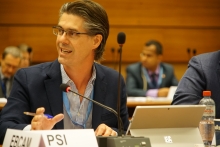Revised Global Tax System could easily fund SDGs says UNCTAD Director

Speaking at the hearing, PSI’s head of Policy and Governance, Daniel Bertossa, highlighted the need for domestic resource mobilisation (increased tax revenue) to be the backbone of development.
“As many of the speakers here have highlighted, the wealth to fund development clearly exists. This is not a question of creating the wealth, nor is it a technical quetsion. This is a question of political will.”
This view was seconded by Director of UNCTAD’s division on Globalisation and Development Strategies, Richard Kozul-Wright:
“The public sector in the past thirty years has been starved of resources - what if we went back to the same taxation system that was in place under Nixon? If you take the tax structure that was present then, it is extremely simple to generate the $1-2 trillion per year of extra resources required to fund the Sustainable Development Goals. This is not a complicated technical exercise - it shouldn’t be a complicated political exercise either.”
UNCTAD’s governing body will meet in June 2018, where a report from the CSO hearing will be submitted.
The UN body has traditionally been viewed as a counter balance to the WTO, giving a stronger emphasis to developing countries in the trade debate.
The increased emphasis on a new global tax system comes after a series of high profile tax leaks and almost five years of campaigning by PSI and a coalition of groups including ICRICT and NGOs such as Action Aid.
PSI also highlighted the need for UNCTAD and other UN agencies to turn away from the promotion of PPPs and Privatisation as a path to development.
Bertossa said:
“The IMF has made clear that PPP’s should not be used to move debt off the public accounts. Yet PPP’s are usually promoted to do exactly that. And the wave of failed PPP’s in the UK, Germany and other rich countries show that PPP’s are not the answer to solve government capacity problems.”
Director Kozul-Wright highlighted the need for an urgent, systemic shift in global rules in favour of development:
“The assumption that the SDGs can be achieved by the private sector is simply false.”
“This is an era of recklessly unregulated finance. It’s our job as an institution to create a rules based system that works for development. At this point in time we clearly have a system that doesn't do that.”

